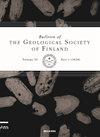A hydrostratigraphical approach to support environmentally safe siting of a mining waste facility at Rautuvaara, Finland
IF 1.3
4区 地球科学
Q2 GEOLOGY
引用次数: 11
Abstract
A hydrostratigraphical approach to support environmentally safe siting of a mining waste facility at Rautuvaara, Finland Based on the construction of a detailed sedimentological model, hydrostratigraphy and local groundwater/surface water flows, this paper analyses the Niesajoki river valley as a suitable area for the expansion of a tailings facility, associated with the nearby Hannukainen (Cu, Au, Fe) mine, Finnish Lapland. Three different glacial/interglacial cycles were identified from the sedimentary observations and, optical stimulated luminescence (OSL) datings showed them to be of Early to Late Weichselian in age. Two groups of hydro-stratigraphical units were identified from hydraulic conductivities. The first, fluvial deposits, lie in the centre of the valley along the valley axis, and are the main aquifers. The second, till group, with lower conductivities, are located on the flanks of the valley. The thickness and complexity of sediments varied across the study area. To the E/SE of the valley, sediments are thick (~40 m), and more complex., In contrast the S/W/NW of the area, sediments are thinner (~10 m) and more simple. Groundwater is found to flow towards the centre of the valley and along its axis, where a bedrock controlled divide forms two groundwater basins. Based on the results of this research, it is suggested that any future expansion of the tailings facility should be restricted to the western and southern side of the valley, where waters are more manageable.支持芬兰劳图瓦拉采矿废料设施环境安全选址的水文地层学方法
在建立详细的沉积学模型、水文地层学和当地地下水/地表水流量的基础上,本文分析了Niesajoki河流域与附近的Hannukainen (Cu, Au, Fe)矿山相关的尾矿设施扩建的合适区域。根据沉积观测,确定了三个不同的冰期/间冰期旋回,光学激发发光(OSL)测年显示它们的年龄为早至晚魏奇塞利世。根据水力导度确定了两组水文地层单元。第一类是河流沉积,位于山谷的中心,沿着山谷的轴线,是主要的含水层。第二组是低导电性的till组,位于山谷的两侧。沉积物的厚度和复杂程度在整个研究区域有所不同。在谷东/东南方,沉积物较厚(~40 m),且较为复杂。与南/西/西北方向相比,沉积物更薄(~10 m),更简单。地下水被发现流向山谷的中心,沿着它的轴线,在那里一个基岩控制的分水岭形成了两个地下水盆地。根据这项研究的结果,建议今后任何尾矿设施的扩建都应限制在山谷的西部和南部,因为那里的水更容易管理。
本文章由计算机程序翻译,如有差异,请以英文原文为准。
求助全文
约1分钟内获得全文
求助全文
来源期刊
CiteScore
1.30
自引率
0.00%
发文量
5
审稿时长
>12 weeks
期刊介绍:
Bulletin of the Geological Society of Finland (BGSF) publishes research articles and short communications in all branches of geosciences. Contributions from outside Finland are welcome, provided that they contain material relevant to Finnish geology or are of general interest.

 求助内容:
求助内容: 应助结果提醒方式:
应助结果提醒方式:


